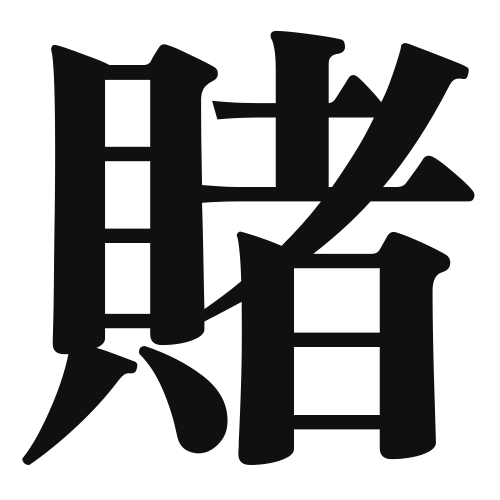1. Overview of Meaning
The kanji “賭” (to) means “to bet” or “to gamble.” It refers to the act of risking something of value, usually money, on the outcome of an uncertain event, such as a game or a race.
2. Formation and Radical
Formation of the Kanji: The kanji “賭” is a compound character. It is formed by combining the radical for “money” (the left part, 賀) and the character for “to throw” (the right part, 投). This combination reflects the idea of throwing money into a gamble.
Radical: The radical of “賭” is “賢” (kan), which relates to wealth or money.
3. Examples of Usage
Common Words and Phrases:
- 賭博 (tobaku) – gambling
- 賭ける (kakeru) – to bet
Example Sentences in Daily Conversation:
- 「彼は競馬で賭けるのが好きです。」(Kare wa keiba de kakeru no ga suki desu.) – “He likes to bet on horse racing.”
- 「賭けに負けたら、何を失うか考えた方がいい。」(Kake ni maketara, nani o ushinau ka kangaeta hou ga ii.) – “You should think about what you might lose if you lose the bet.”
4. Synonyms and Antonyms
Similar Kanji:
- 賭け (kake) – a bet (more informal)
- 賭博 (tobaku) – gambling (broader term that includes various forms of betting)
Antonyms:
- 守る (mamoru) – to protect (as in safeguarding one’s possessions rather than risking them)
5. Cultural and Historical Background
Relation to Japanese Culture: Gambling has a long history in Japan, with traditional games like “hanafuda” and “pachinko” being popular. The kanji “賭” reflects this cultural aspect of risk and chance.
Proverbs and Idioms:
- 「賭けに出る」(kake ni deru) – “to take a gamble” (to take a risk in a situation)
- 「賭けは運次第」(kake wa un shidai) – “the bet depends on luck” (emphasizing the role of chance in gambling)
